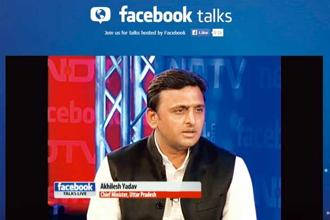When politics gets social
In the run-up to the general election, social media companies explain how the political campaigns this time are very different from what they were five years ago.
The article by Chanpreet Khurana was published in Livemint on March 11, 2014. Sunil Abraham is quoted.
“Okay, I didn’t gain anything. I lost,” Aam Aadmi Party (AAP)’s Arvind Kejriwal conceded disarmingly during a town hall meeting on Facebook last week. He was responding to a question from Candidates 2014 host Madhu Trehan on his much critiqued dharna (sit-in protest) during his 49-day chief ministership of Delhi.
Even as elections to 543 constituencies approach, political parties and politicians are putting their online campaigns in top gear. Sample some of the activity in just the last week. On Sunday, the Indian National Congress party asked voters to share their thoughts on what to include in the party’s Lok Sabha election manifesto—on Twitter. On 8 March, Narendra Modi, the Bharatiya Janata Party’s prime ministerial candidate, held the second session in his Chai Pe Charcha with NaMo series—this time on women’s empowerment. And All India Trinamool Congress chief Mamata Banerjee’s “Girls are our assets” post on Facebook was liked more than 22,000 times.
 |
Recognizing the high level of engagement around politics on social media, companies like Facebook and Google are driving initiatives on this theme in peak election season—polling starts on 7 April. The Facebook Talks Live’s Candidates 2014 series (also broadcast on NDTV), which in its first week featured Kejriwal, Banerjee, Rashtriya Janata Dal chief Lalu Prasad and the Samajwadi Party’s Akhilesh Yadav, is one example. There are many new services being launched online in the run-up to the Lok Sabha election. |
|---|
Know your candidate
On 20 April 2011, US President Barack Obama appeared on Facebook Talks Live, opening the floodgates for a new kind of engagement between political leaders and the electorate. Cut to almost three years later, and the Facebook-led “town hall” meeting has come to India. On 4 March, Candidates 2014 launched with Kejriwal taking questions on issues like women’s safety, reservation for the backward classes and the plight of contractual workers, and detailing his vision for the country. A video of the town hall is available on Facebook and YouTube and has been viewed at least 30,000 times. As part of the format of the town hall, the questions came in equal parts from the live audience, Trehan and from a pool of questions submitted on the Facebook India page.
To the agile leader then, social media can be more than just another pulpit to broadcast views and give a speech from. It’s something Sunil Abraham, executive director of The Centre for Internet And Society, a non-profit research organization, can’t stress enough. “Social media provides unmediated access; in that sense it is a tremendously effective tool,” says Bangalore-based Abraham in a phone interview. “The question is, are political parties agile enough to take advantage of it?”

